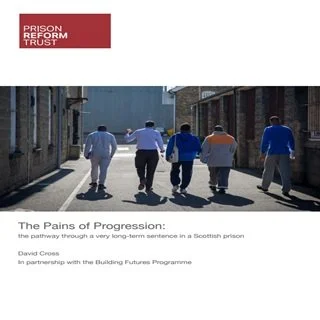By David Cross In partnership with the Building Futures
This report forms part of the Prison Reform Trust’s (PRT) National Lottery Community Fund funded Building Futures Programme that, since 2020, has been exploring the experiences of people serving long-term prison sentences. The programme has defined its long-term cohort to include those men that will spend 10 or more years in prison and eight years or more for women. This prisoner-led collaboration sheds light on the perspectives of men serving such long-term sentences at HM Prison Glenochil in Scotland, regarding their progression within the prison system. It seeks to amplify the voices of those most directly affected by the progression process, highlighting their experiences and the personal impact associated with decision-making and delays. We conducted a comprehensive survey, designed and led by small working groups of men currently imprisoned in Glenochil, targeting all men with sentences of 10 years or more and those serving indeterminate sentences. This survey helped to identify the critical issues concerning prisoner progression as perceived by the men themselves. Subsequently, a series of focus groups provided a platform for in-depth discussions, allowing participants to express their experiences and concerns. The findings of the survey and focus groups reveal significant challenges faced by very long-term prisoners. One of the most telling points made in one of the sessions reflected a widely held view: Issues identified include the perceived fairness of access to programmes and to less secure conditions, and the impact of early release arrangements. The data reflects the urgent need for reforms aimed at enhancing the timeliness, fairness and transparency of these processes. These findings will be presented across six main themes: Personal change and development: while taking responsibility for personal change and development is clearly seen as being important from the perspective of the men serving long sentences - both for its own sake and in contributing to progression - there is a commonly held view that this is not reflected in the formal decision-making processes. Fostering and sustaining hope: the loss of hope permeated all of the discussions, and the uncertainties regarding the progression pathway and release dates, create a culture in which it is difficult to identify measures which could help to foster and sustain hope. Sentence length, tariffs and time served: for the majority of the men serving indeterminate sentences, there is an enormous gap between the ‘punishment part’ or tariff and the actual length of time served. This has a substantial impact on the prisoners’ experience of progression, and many reported having long periods in which there was no evident progression at all. Assessments, programmes and less secure conditions: many of the men identified difficulties arising from the processes related to all of these elements of the very long-term prison experience, and in particular, the overwhelming majority reported very significant delays throughout these processes which had the cumulative effect of adding years to the period of time actually served. Diversity and inclusion: there was evidence presented to the consultation that indicated that the difficulties experienced by very long-term prisoners in relation to their progression were exacerbated where there were additional characteristics, and that the prison did not take sufficient account of their statutory duties in this regard. Trust: prisoners reported that factors such as the gap between expectation and reality in the progression pathway; the range of factors contributing to this gap; the difficulty in establishing positive relationships with key staff at the right time; examples of demeaning and careless treatment; and the difficulty in establishing accountability for these difficulties combine to create a loss of trust. This in turn negatively affects the engagement of prisoners in activities that support progression.
London: Prison Reform Trust, 2025. 22p.


